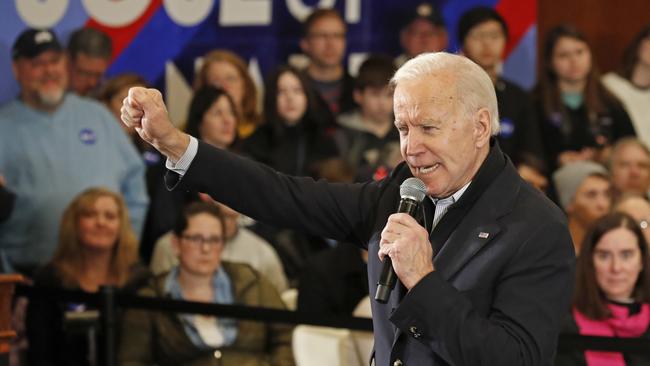2020 race: Wide field means Democrat contest may go down to the wire

Three days before the Democrats meet in New Hampshire for the state’s presidential primary election on Wednesday AEDT, Joe Biden released an advertisement attacking Pete Buttigieg for his lack of experience as a former mayor of a city of 100,000 people in Indiana, and reminding voters of his own CV as Barack Obama’s vice-president.
Perhaps it was Biden’s poor performance in Iowa the week before that put him on the offensive. Or maybe the Granite State’s chilly winter nights have frozen the heart of “Uncle Joe”. Either way, the ad — one of the most negative of the Democrats’ primary campaign so far — laid bare two facts about Biden’s campaign: he is flailing, and he sees Buttigieg as his chief competitor.
For months, Biden’s campaign had a veneer of inevitability to it. Former vice-presidents are typically shoo-ins for presidential nominations, if not the presidency. But for Biden, that illusion was shattered in the Iowa caucuses last week. He came fourth with only 15.8 per cent of the vote, beaten by Elizabeth Warren by more than two percentage points, and more than 10 percentage points behind Buttigieg and Bernie Sanders.
Buttigieg will probably survive the assault. Voters in New Hampshire are likely to see the advertisement for what it is: a candidate in distress gasping for air. “Being a First in the Nation Primary voter is a huge responsibility,” says Ray Buckley, chairman of the state’s Democratic Party. “When you meet a voter at a campaign event, chances are they have met at least a handful of candidates.” In other words, no one will be surprised to hear about Mayor Pete’s youth or Biden’s experience.
Since winning the plurality of pledged delegates in Iowa, Buttigieg has shot up in the polls. This is a common pattern historically; Iowa’s winners typically enjoy double-digit bounces in national polling over the next few months. The Economist’s average of polls finds Buttigieg climbing fast in New Hampshire. Polls released at the weekend pushed his support from 16 per cent to above 20 per cent. He is favoured to finish second behind Sanders, whose numbers are hovering near 30 per cent.
Sanders remain the strongest candidate in New Hampshire. He has topped the polls there for most of the past month. Edith Tucker, a state representative from the northern town of Coos, says that voters credit him for his authenticity: “He gives the same speech, but you feel that he’s letting it all out. And he’s not pandering to you.”
Consistency has been one of the key points in his campaign, and his embrace of far-left policies and democratic socialism have not turned off many voters.
Sanders’s biggest strength is not his platform or his charm, however, but the long list of candidates on offer to Granite State voters. If polls are right in giving him nearly 30 per cent of the vote, that would be less than half the share he secured in the 2016 Democratic primary in New Hampshire. Yet as in Iowa, a fractured opposition makes it hard for any challenger to topple Sanders.
This lays bare Biden’s motivation for attacking Buttigieg: if he does not soon establish himself as the clear moderate alternative to Sanders, he will not stand a chance of winning the nomination. While the centrists struggle to coalesce around a single candidate, Sanders can rack up wins that attract favourable media coverage and campaign contributions.
It is still possible that no candidate at all wins an outright majority of delegates. According to the election handicappers at FiveThirtyEight, a data-journalism website, Sanders is currently favoured to win the nomination. But winning bare pluralities will not be enough to put him on top; his average predicted delegate haul is only about 1700 of the 1990 pledged delegates needed to win the nomination.
Biden’s path to the nomination also looks tough. His original campaign strategy relied on surviving early defeats by pulling off big wins in states that vote later in the primary calendar. But this prospect has recently declined. According to The Economist’s aggregate of primary polls, the former vice-president is now tied with Sanders in the Nevada caucuses, the third contest last next week, and has fallen from 40 per cent to 30 per cent in South Carolina on February 29. Buttigieg and Warren will have trouble winning a majority of delegates, as both fare badly with non-white voters, who make up a larger share of the electorate as the campaign goes on.
The chances of any of these candidates reaching a majority is further complicated by the rise of Mike Bloomberg, the billionaire former mayor of New York who has poured hundreds of millions of dollars into the race and scores above 10 per cent in national polls. Although he will not campaign in the first four states, he could do well on Super Tuesday, March 3, when more than a dozen states will hold primaries.
Bloomberg is performing strongly in Texas and California, states that together account for 16 per cent of the pledged delegates. But a good showing by him would mean even greater fragmentation among the delegate.
As candidates make their final preparations in New Hampshire, a contested convention in which no candidate has enough delegates to win outright is looking ever more likely.



It is not the sort of thing that moderates are supposed to do.